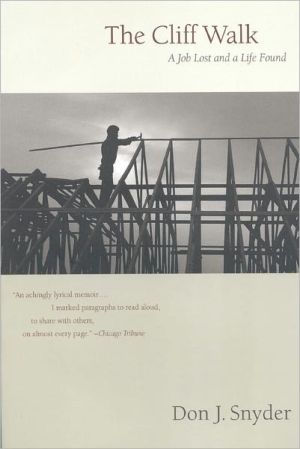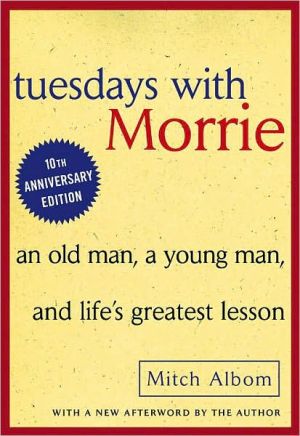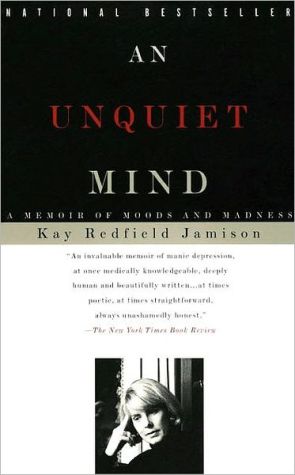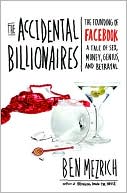The Cliff Walk: A Memoir of a Job Lost and a Life Found
Snyder's account of temporarily losing his way in life presents a heartrending and inspiring memoir that "confronts the not-so-secret fear that haunts every American who works for a living" ("Atlanta Journal-Constitution"). Author pubilcity. .\ \ \ In this moving, clear-eyed memoir, the author of A Soldier's Disgrace and From the Point chronicles his journey from college professor to a day laborer on food stamps, capturing in powerful detail the economic free fall so...
Search in google:
Snyder's account of temporarily losing his way in life presents a heartrending and inspiring memoir that "confronts the not-so-secret fear that haunts every American who works for a living" ("Atlanta Journal-Constitution"). Author pubilcity. . Publishers Weekly In 1992, Snyder, a writer (Veteran's Park) and an English professor at Colgate University, learned he would not get tenure and that his lucrative teaching job would end in another year. Happily married with four children under the age of seven, Snyder alternated between overconfidence and fear as he attempted to get another university position. This gripping and well-written chronicle, a portion of which was published in Harper's in 1995, describes how being rejected for 90 jobs plunged Snyder into mind-numbing despair. Despite the deep love of his wife, Colleen, the author, who had struggled to enter the privileged world of academia in the first place, was unable to face applying for food stamps or paying the bills with Colleen's child-care jobs. Snyder's depression ended when he was able to accept the loss of his sense of entitlement, and he took a job as a day laborer to support his family. This honest, articulate memoir skillfully explores the psychological as well as the financial pain that comes with the loss of a statusy job and income. Author tour; national publicity. (Apr.)
The Cliff Walk\ A Memior of a Job Lost and a Life Found \ \ By Don J. Snyder \ Sound Library\ Copyright © 1999 Don J. Snyder\ All right reserved.\ ISBN: 9780792723271 \ \ \ \ \ Chapter One\ \ \ When word started getting around the university that I'd been fired, a student came up to me after class one morning and gave me the lay of the land. He was a smart kid, sweet too. He said he was sorry first, then he let me have it. "Man, not another baby boomer out of work," he said, shaking his head. "Every time one of you guys loses his real job you take the crap jobs at Blockbuster and the mall so I can't even pick up summer work."\ I dismissed this comment. Things had gone so well for me for so long that I didn't see I was standing right next to him on a dividing line between how you imagine your life will turn out and how it actually does. After spending my whole grown-up life shaking hands, making promises, and smiling at the right people in order to be liked and to get ahead, to stay ahead and never slip, I was a man who had forgotten how lucky he was.\ It was early March of 1992, I was forty-one, married, with three children under seven years old and a fourth due in June. We were living an unhurried life in upstate New York, in a small town in a big house on easy street where we paid our way each month without much sweat.\ This waspretty much the same safe and privileged life I had known from the time I left behind the rattrap apartments of my childhood in Bangor, Maine, for a classy private college on a football scholarship and then graduate school on a big fat fellowship I don't remember even being grateful for. I was in the passing lane, leaving behind my uncles, grandfathers, and cousins who lived out their lives as low-wage, no-ambition, Lawrence Welk on Saturday nights, two weeks off a year, classic American working stiffs. They were nice enough guys but guys who were going nowhere. As soon as I was old enough to see how the world worked I began working hard to get enough velocity in my own life to escape theirs like a man fleeing a fire.\ I never looked back. I went from one promising job to the next. Even when I had a good job I was always looking for a better one, and sometimes I would take job interviews just for the chance to see what I was worth to a stranger and to listen to him tell me how marvelous I was. I had quit a good job at the University of Maine, where I was completely happy, to take a job in the Department of English at Colgate University for more money than the combined income of both of my uncles when they retired. At the time there was that goofy commercial on television where a handsome Irishman goes dashing across an impossibly green field, smiling like a politician because he's so happy with his new deodorant soap. It could have been filmed on the Colgate University campus, where the lawns and the playing fields were as lush and green as Ireland when we arrived in late-August 1989. My students affectionately called the place Camp Colgate and the Colgate Country Club, and told me that they had chosen this over other schools because of the university's ski slopes, which I could see from my office window, or the squash courts and beautiful indoor tennis courts, or the award-winning eighteen-hole golf course and the trap-shooting range that were a short bike ride from campus, or because the university was ranked academically among the top twenty in the country for getting students into law school, or because Colgate had been celebrated as one of the nation's best party schools, based upon its per capita consumption of alcohol.\ My own reason for choosing Colgate was no more substantial: it was right up there with the Ivy League schools, maybe not quite an Ivy League school, but definitely just one step, one job away. There was also a long list of irresistible perks that included several thousand dollars to order any books I wished for the library; a retreat on Lake Saranac where we could spend weekends as a family and have out meals prepared for us; a low-interest loan for the purchase of a house in town a few blocks from campus; a gift of three grand for a summer project, plus paid student research assistants if I needed them; generous health, dental, and life insurance plans; a marvelous retirement pension plan that would multiply like cells dividing; free tuition for my wife to take courses toward her master's in education and for my four children to attend any college in America; a discount in the campus bookstore; a new Macintosh computer system; a paid sabbatical leave after three years of teaching; and most of all, time. Five weeks off at Christmas, ten days off during spring break, three months in the summer. This amounted to roughly eighteen weeks of paid vacation per year. Plus an additional ten weeks if you added up my two free days each work week of the academic year.\ It was a dream. My full teaching load was nine hours a week in the classroom first semester, six the second. There had never been a violent crime in town. We bought a six-bedroom house on a tree-lined street a few blocks from campus and the elementary school. In contrast to the nonacademic residents of town, most of whom earned little more than the minimum wage, my faculty salary enabled us to live like royalty, and Colleen was able to fulfill her long-standing desire to stay at home with our children.\ That first winter it snowed every day in December but two, and the campus was transformed into a wonderland. We pulled the kids all over town on their sleds, and got them up on skis. Colleen taught them her fine technique for making angels in the snow. Once when I turned my head from a department meeting on the third floor of Lawrence Hall to glance out the window, I saw my whole family down in the quad putting the finishing touches on a giant snowman. It made me feel that our life was charmed.\ I remember the nights best. They were so magnificently cold and bright that Colleen and I often stood outside looking up at the stars before we went to bed. The only tension between us in those days was the result of my wife's honesty. A true Maine woman, she felt no need to try and impress anyone. I was in the faculty lounge schmoozing the feminists in the department one morning when Colleen appeared with the kids. They got to talking and when one of my colleagues related how she had gone straight back to work after her baby was born because she didn't feature spending her days at home changing diapers, Colleen coolly announced that on the worst days there were maybe ten diapers and each took no longer than a minute and a half to change. The feminists looked at her like she was quaint or exotic, and when we were alone I cautioned Colleen that someday I might need letters of recommendation from these women in order to grab a better job at a much better school.\ The best part about the job by far was my students. They were so pleasant and eager to please that I went the extra mile, taking on more of them as my advisees than anyone else in the department, inviting them to our house for dinner and movies, and teaching literature with a no-holds-barred passion that made my classes some of the most popular on campus. That wasn't hard, really, because these were the days in academia when most professors droned on about preposterous literary theories while their students fought bravely against sleep. I was well paid for my efforts and nominated every spring for "Professor of the Year" by the Student Honor Society, which sent me beautiful letters extolling my devotion to bringing literature to life for students.\ In fact I received another one of those letters in March of 1992, my third year, the same day the dean of faculty wrote to inform me that I was being fired.\ The terms of my dismissal were as fair as anyone could ask for: I would be allowed to finish the rest of my third year and to return for a fourth with a pay raise, full benefits, and an additional stipend of three thousand dollars if I wished to serve as advisor to the debate club. Meanwhile the dean would recommend me highly to other universities, with an official letter that said I was being dismissed simply because the English department was already top-heavy with tenured professors.\ In all the jobs I had held across the years, from the first, picking vegetables when I was thirteen, I had never been fired. My first reaction was that some mistake had been made. They got the wrong guy. They don't know that Colleen has just finished making curtains for the house and painting the kids' rooms and we've just drained our savings account of its last nine thousand dollars to replace the cast iron pipes with copper and to strip the basement of asbestos. They got the wrong guy. They don't know that we've got a new baby coming, and that my father has a brain rumor that is taking over his life.\ I sat on our back porch and read the letter several times before I walked to campus, climbed the hill to the dean of faculty's office, and waited there until he could see me. I had enough self-confidence then--or maybe it was arrogance or just a long history of successes--to think that I would be able to fix things. I'd say the perfect thing. I'd tell him about all my achievements. I'd make the right impression and the decision would be recanted. It would be like nothing had ever happened.\ I watched the secretaries answering telephones and typing into their computers. Okay, I thought, this is what I'm going to do, I'm going to explain very calmly to the Dean that I'm the only professor in the English department who teaches a freshman seminar, the only one who teaches an upper-level general education course every term, the only one who volunteers to teach multiple sections of the required survey course, and that no one has taken on more advisees or sponsored more independent studies than I have. The dean doesn't know me personally so I have to make him see who I am. With three published books to my credit, a stunning graduate school record, and letters of generous praise in my dossier, all I have to do is press the pedal down a little harder.\ He was gracious and in a hurry. While he was promising that he would write me glorious letters saying how I was loved by my students and respected by my colleagues, I was watching him glance at the big clock on the wall, and I was thinking, Wait a second, pal, you're not going to give me the bum's rush here. We're going to take a long time, maybe the rest of the afternoon, because I've got a lot of wonderful things to tell you about myself and about the work I've done here while you were playing computer golf in your office.\ I laid it out for him, but I could tell by the way his smile never changed that I was already floating off his screen. I heard my voice climbing a little too high as I explained to him that my father was ill and that we had a new baby coming. When at last he put his hand out for me to shake, I was short of breath.\ His pasted-on smile. My embarrassment. "I'm sorry," he said, showing me to the door.\ That night I read The Littlest Angel to Nell and Erin at bedtime. When they conked out I sat down on the floor by their nightlight and tried to figure out the finances of losing my job. With monthly expenses of just over two thousand dollars, I figured that we would be able to save around $140 dollars each month from my remaining paychecks. That was seventeen monthly paychecks until I would be cut off on August 1, 1993. Two thousand three hundred eighty dollars. But before my last check I would have to reimburse Colgate the five thousand dollars they had loaned me for a down payment on the house. So, aside from whatever it was going to cost to move, we were going to be short by almost three thousand.\ I waited until Colleen was asleep that night and then I walked from room to room with a flashlight, taking inventory of our possessions and deciding what we could sell and for how much. The washer and dryer were worth four hundred. How Colleen had loved having a proper laundry room, with its wide window taking in the afternoon sun. She folded laundry every day at the long low shelf below this window, though I couldn't remember ever seeing her do it. In the dining room there was the table I had built out of rough boards. It was worth maybe twenty bucks now that it was permanently stained from the kids doing their oil paintings there with Colleen. In the playroom another table worth another twenty bucks. I shined the flashlight up at a corner of the ceiling that I had patched with sheetrock; I had done dozens of jobs like that in the house; there wasn't any job I wouldn't tackle so long as it fit my one criterion--I had to be able to begin the job and complete it in a single day because, after all, I was a busy man with more important things to do. Along the windowsills Colleen had lined up the seedlings she was growing with the kids in anticipation of a garden by summer. I knelt down and read the little name tags of each plant scrawled in the girls' handwriting. I thought how long it must have taken them to write the names, making mistakes, erasing, starting over again, their mother waiting patiently and encouraging them until the names were right. In the kitchen I examined the refrigerator, moving aside the magnetic letters and checking for scratches. Two hundred dollars, maybe. In the guest room was a bureau made of cherry that had to be worth four hundred. It had belonged to my father when he was a young man, and Colleen had already identified it as more than a piece of furniture; it was something she wanted to pass on to our children. In the living room there were two couches, each worth a hundred and fifty. Two wing chairs that had to be worth at least seventy-five. The one near the woodstove was where Colleen spent a winter breast-feeding Jack. I saw her unbuttoning her blouse for him and cupping his blond head in one hand while she fed him. Upstairs she was in each room, in the mobiles swaying above the kids' beds, and the needlepoint murals hanging on the walls, and the stenciled bureaus. I followed the bright shaft of light through the darkness, feeling more and more like a burglar, a stranger in this house. Colleen and the kids had lived in these rooms that I had merely passed through.\ I figured somewhere around fourteen hundred. And maybe if we lived very carefully we could cut our monthly miscellaneous expenses from four hundred to two hundred. That would mean another $3,400. So, after repaying Colgate the five thousand, we might have two thousand left by the time I was cut off.\ The next day I went to the human resources office and found out that I could cash in my pension for $16,800, minus $3,200 in tax penalties. I added this amount of $13,600 to our projected savings of $2,000: $15,600. It didn't look bad at all. I had seventeen more months on Colgate's payroll, and by the last month we would have $15,600 in an emergency fund. Then I would begin a new job with a new monthly income kicking in. So as long as we could sell our house for as much as we'd paid for it, there was really nothing to worry about.\ But when it came to telling Colleen that I had been fired, I never could seem to find the right time, or the right room in our house. There was always her with her lovely pregnant belly and her faith in me, and then there was me with my pink slip.\ The night I finally told her, it was good and cold, cold enough to skate on the backyard rink I had built. When I went upstairs to our bedroom, I found Colleen asleep with a book in her hand. I knelt down and leaned close enough to her face to feel her breath. In the late stages of her pregnancies I used to love to lift up her nightgown while she slept and watch the baby rolling around in her belly. Tonight each time the baby moved, Colleen's eyelids fluttered. I sat there for a long time before I kissed her cheek to awaken her.\ "Did someone throw up?" she asked me.\ "Let's go skating," I said.\ "What time is it?"\ "Late," I said. "Middle of the night."\ She closed her eyes and waved goodbye to me.\ "I'll make hot chocolate?"\ She sighed.\ "If I carry you downstairs, will you skate with me?"\ "If you try to carry me downstairs, you'll never skate again," she said.\ By the time we reached the ice I was lost in her pretty face just as I had been the first time I saw her ten years before. Under starlight we did our Olympic skit of the two Russian ice dancers, Nikita and Vladimir, drunk on vodka, that always made the kids laugh. I twirled her around in the cone of white light from the spotlight. I was looking at her and feeling her presence so deep inside me it was as if there were no space between where I ended and she began. What I liked best about moments like this was how different we seemed from the rest of humanity. Everyone else in the world was asleep in their boring lives, their clothes laid out on a chair for the next day, which would not distinguish itself from the day before. Not us. We were up and on the move. "Here's the news, beautiful," I finally said. "I got fired."\ She turned and faced me and asked if I was telling her the truth. When I heard the disappointment in her voice it surprised me because across the years she had been the adventurous one in our marriage, right from the start, when we eloped in England and snuck into a first class train compartment and made love beneath our overcoats. She had always loved new places. In 1987, when we had saved a little money for a down payment on a house, she decided we should use it to go to Ireland for the winter. We had a newborn baby and an eighteen-month-old and we were flying across the Atlantic in the dark of night, still undecided whether we would get off the plane in Shannon or Dublin.\ I felt her pull her hand out of mine. The spell was broken and she glided away from me. "Now we'll be free to try out for the winter Olympics," I called to her.\ At first she didn't say anything. Then she skated back and told me how her father had been laid off once when she was a little girl; he was so ashamed he pretended to go to work each day, and for a couple of months he fooled the family.\ "Your father's like all the men I grew up around," I told her. "To them, all the great enterprises of life--political elections, religion, even love itself--had no meaning unless they were holding down a job."\ She turned away and skated back into the darkness. I was wondering if she was going to mark this as the first bad thing that had happened to us in the ten years since we'd met, years she had spent happily with her healthy, smiling babies in tow, while the screaming siren in the dead of night was always for someone else.\ "Who needs this place?" I called to her. I skated to her side and took her hand again. I told her there was plenty of time for me to find another job. I pulled her close. "Where do you want to go next?" I asked. She rested her head on my shoulder and didn't say anything. I pressed my face against her hair and looked up through the branches of a tree at a constellation of stars that I couldn't name. I asked her which one it was and she told me. Colleen had tried hard to get me to pay attention to such things, to learn the types of flowers and trees in the places where we had lived together so I could teach our children. I had always heard her and never complied with her efforts to get me to live in the present tense, the way small children do, rather than how I had always lived, inside my vast intentions and vague ideas, which, to her, were only dull abstractions when set alongside something as fine as the starlight above us. I don't know. Blame it on my escape velocity, I guess. I was moving too fast to pay much attention.\ "I know it's only a job to you," she said thoughtfully.\ Then I knew what it was--for me this place was just another stop on the long arc of achievement and acquisition, but Colleen had made a home here.\ I told her everything would be all right. "I'm not worried at all," I said.\ "It's just that the kids are so happy here," she said. She looked back at our house. "Erie and Nell in their school. Jack learned to walk here ... and with the new baby coming ... I don't know, I guess I just didn't want to have to think about moving."\ "We don't have to think about it for a whole year," I told her again.\ "And I thought you were happy here too," she said softly. "You seemed happy."\ "I have been happy," I said. "And I'll be happy someplace else. But that part is way down the road. You don't have to think about it now."\ "I'll think about it every day," she said. And this, I recognize now, was the difference between us; I would put my head down and plow right through the next year and then move on without ever looking back even to write a letter to anyone I'd known here. But from now on, each time Colleen was with her friends she would think about having to leave them.\ When she reached the porch I called to her. "What I meant is, it's no big deal, Colleen. I lost a job, that's all. I'll find a better one. "\ When she opened the back door, light from the kitchen fell onto the snowbanks. I watched her stop in the doorway and I thought she was going to wait there for me or tell me to come up to bed. But instead, she stood with her head down for just a moment in the box of yellow light and then went inside and closed the door.\ Recalling that night, I see her hesitating there in the lighted doorway of the house where she would wake in the night to feed the new baby, sitting at the front windows and looking across the darkened rooftops of houses where people she cared about lived.\ I stayed outside and skated by myself for a while. Maybe some people lay awake at night taking stock of themselves, measuring the sum of what they possess in this world, of all that they have worked hard to attain and how easily they might lose it. Not me. Not then, anyway.\ \ Continues...\ \ \ \ Excerpted from The Cliff Walk by Don J. Snyder Copyright © 1999 by Don J. Snyder. Excerpted by permission.\ All rights reserved. No part of this excerpt may be reproduced or reprinted without permission in writing from the publisher.\ Excerpts are provided by Dial-A-Book Inc. solely for the personal use of visitors to this web site. \ \
\ Publishers Weekly\ - Publisher's Weekly\ In 1992, Snyder, a writer (Veteran's Park) and an English professor at Colgate University, learned he would not get tenure and that his lucrative teaching job would end in another year. Happily married with four children under the age of seven, Snyder alternated between overconfidence and fear as he attempted to get another university position. This gripping and well-written chronicle, a portion of which was published in Harper's in 1995, describes how being rejected for 90 jobs plunged Snyder into mind-numbing despair. Despite the deep love of his wife, Colleen, the author, who had struggled to enter the privileged world of academia in the first place, was unable to face applying for food stamps or paying the bills with Colleen's child-care jobs. Snyder's depression ended when he was able to accept the loss of his sense of entitlement, and he took a job as a day laborer to support his family. This honest, articulate memoir skillfully explores the psychological as well as the financial pain that comes with the loss of a statusy job and income. Author tour; national publicity. (Apr.)\ \ \ \ \ Library JournalSnyder (From the Point, LJ 4/15/88) had to come to grips with reality when he learned he would not be granted tenure as an English professor at Colgate University. Snyder had a wife he adored, three beautiful children, one on the way, and what he thought was a secure, lifetime "dream" job. Sure he would get another job, especially because the Student Honor Society had nominated him each spring for "Professor of the Year," Snyder was caught off balance when he received 90 rejections. Inertia, depression, and despair set in as he awaited another teaching position that never came. Snyder details the various painful stages his family had to go through, from selling their house to buying food with food stamps. When he could no longer take it, he accepted a job as a day laborer to provide for his family. Snyder writes with skill, insight, and sensitivity. Given the current upheaval in the status of tenureand, indeed, the upheaval caused by downsizing generallySnyder's book is timely. Highly recommended for general collections.Bellinda Wise, Nassau Community Coll. Lib., Garden City, N.Y.\ \ \ Patrick BoyleUltimately a story about family, identity, and purpose. The questions that Snyder poses go to the core of American middle-class life….\ —The Washington Times\ \ \ \ \ Tom GrimesA scary, beautiful, moving memoir…the house building section contains some of the best writing about work in American literature.\ —Austin American-Statesman\ \ \ \ \ Anne MatthewsA cautionary fable…strengthened by novelistic pacing and detail…fortunately on his journey to another life, Mr. Snyder took good notes. —The New York Times Book Review\ \








